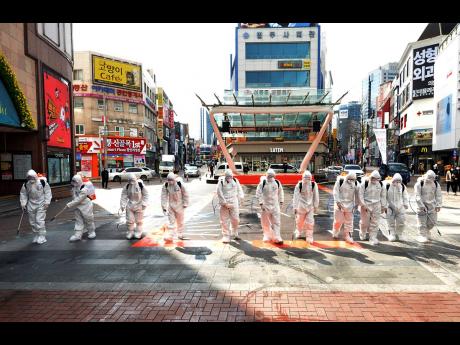Vexed by how to contain virus, countries take tough steps
BANGKOK (AP):
Saudi Arabia cut travel to Islam’s holiest sites, South Korea toughened penalties for those breaking quarantines, and airports across Latin America looked for signs of sick passengers Thursday as the new virus troubled a mushrooming swathe of the globe.
With the illness pushing its way into a sixth continent and the number of sick and dead rising, the crisis gave way to political and diplomatic rows, concern that bordered on panic in some quarters, and a sense that no part of the world was immune to the disease’s spread.
“Viruses don’t know borders and they don’t stop at them,” said Roberto Speranza, the health minister in Italy, where northern towns were on army-guarded lockdowns and supermarket shelves were bare.
As growing parts of Europe and the Middle East saw infections and a first case was found in South America, air routes were halted and border control toughened. But for an illness transmitted so easily, with its tentacles reaching into so many parts of the world, leaders puzzled over how to keep the virus from proliferating seemed willing to try anything to keep their people – and economies – safe.
Japanese Prime Minister Shinzo Abe called for schools across the country to close for weeks, a decision that impacted 12.8 million students.
“The most important thing is to prevent infections,” said Norinobu Sawada, vice-principal of Koizumi primary school, “so there aren’t many other options.”
Markets shuttered
In South Korea, the hardest-hit country outside China, four Busan markets known for colourful silks and a dizzying array of other wares were shuttered, while the country’s military sent hundreds of its doctors and soldiers to aid in treatment and quarantines.
In Iran, the front line of Mideast infections, officials loosened rules barring the import of many foreign-made items to allow in sanitisers, face masks and other necessities, and removed overhead handles on Tehran’s subways to eliminate another source of germs. Peru put specialists on round-the-clock shifts at its biggest airport, Argentina took the temperature of some new arrivals, and El Salvador added bans for travellers from Italy and South Korea.
The holy city of Mecca, which able-bodied Muslims are called to visit at least once in their lives, and the Prophet Muhammad’s mosque in Medina were cut off to potentially millions of pilgrims, with Saudi Arabia making the extraordinary decision to stop the spread of the virus.
With the monarchy offering no firm date for the lifting of the restrictions, it posed the possibility of affecting those planning to make their hajj, a ritual beginning at the end of July this year.
“We ask God Almighty to spare all humanity from all harm,” the country said in announcing the decision.

